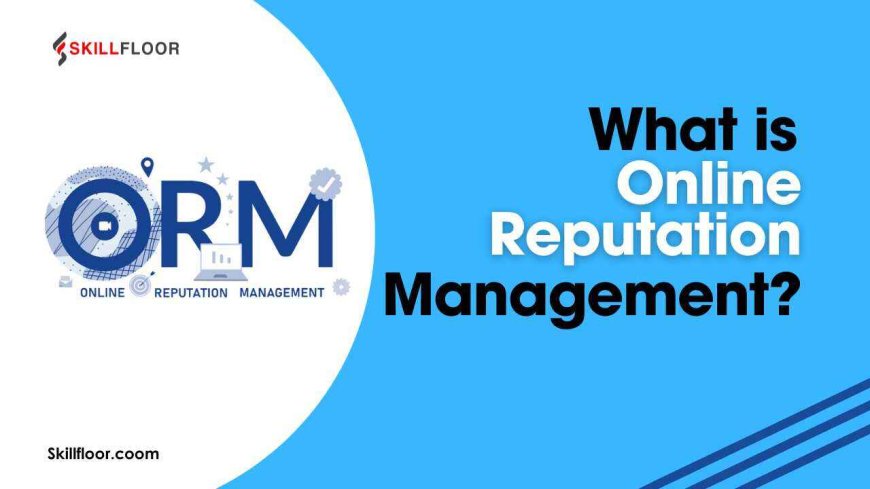What is Online Reputation Management?
Learn what Online Reputation Management is and how it can help protect and improve your brand's image online. Essential strategies for managing your digital presence.

As a digital marketer, I've come to realize that Online Reputation Management (ORM) is more than just a buzzword it's an essential aspect of building and maintaining a brand’s credibility online. The reputation of a business is no longer shaped solely by word of mouth or traditional media. Instead, it is significantly influenced by what is said about it on social media, review platforms, and search engines.
In simple terms, Online Reputation Management is about actively monitoring, managing, and improving how a brand, company, or individual is perceived online. This means not only addressing negative feedback but also highlighting positive content that reinforces the brand’s image.
Whether it's responding to customer reviews, engaging with followers on social media, or ensuring that the first page of Google results reflects the best version of your brand, ORM requires constant attention. I’ve seen firsthand how a well-managed online reputation can lead to increased trust, better customer relationships, and ultimately, business growth.
ORM is like your digital PR—it’s all about controlling the narrative, making sure that your brand is seen in the best possible light, and being prepared to tackle any issues head-on.
Understanding Online Reputation Management
At its core, online reputation management is the process of monitoring, influencing, and controlling how an individual or organization is perceived on the internet. This involves tracking online mentions, responding to negative comments, building a positive image, and addressing misinformation. In a broader sense, ORM encompasses everything from managing customer reviews on platforms like Yelp or Google Reviews to cultivating a positive presence on social media and even managing search engine results.
The goal of ORM is simple: to ensure that when people search for your name, brand, or business, the information they find is favorable and accurate. This might sound straightforward, but in practice, it can be quite complex.
Benefits of Effective ORM
Effective Online Reputation Management (ORM) leads to enhanced trust and credibility, improved customer relations, and a competitive edge in the marketplace. According to a BrightLocal survey, 85% of customers place an equal amount of faith in online reviews and personal recommendations (BrightLocal). Furthermore, sales might rise by 20–30% with a favorable online reputation, underscoring the importance of reputation management. This highlights the critical role ORM plays in modern business strategies (ShoutAboutUs)

- Enhanced Trust and Credibility: Builds trust with potential customers and stakeholders, showcasing reliability and professionalism.
-
Improved Customer Relations: Good conversations and timely replies help to build enduring bonds with clients.
-
Competitive Edge: Having a good reputation helps you stand out from the competition and draws in new business and chances.
-
Increased Sales and Revenue: Business growth may be generated by positive evaluations and an active online presence, which can increase sales by 20–30%.
-
Better Customer Insights: To improve goods and services, it is helpful to monitor client feedback.
Components of Online Reputation Management
Effective online reputation management is multi-faceted. It involves various strategies and techniques designed to influence public perception positively. Below are some key components of ORM:
1. Monitoring Your Online Presence: The first step in managing your online reputation is knowing what people are saying about you or your business. This means regularly monitoring your online presence across various platforms, including social media, review sites, forums, and even news outlets. Tools like Google Alerts, Mention, and Brandwatch can help automate this process, notifying you whenever your name or brand is mentioned online.
Monitoring allows you to stay informed about the conversations happening around your brand or name, enabling you to respond quickly to any negative feedback or misinformation.
2. Responding to Reviews and Comments: Once you know what people are saying, the next step is to engage with them. This is especially important when dealing with negative reviews or comments. Ignoring negative feedback can worsen the situation, giving the impression that you don’t care about your customers or reputation.
When responding to negative reviews or comments, it’s important to be professional, empathetic, and solution-focused. Acknowledge the issue, apologize if necessary, and offer a way to resolve the situation. This not only helps repair your relationship with the unhappy customer but also shows others who may read the exchange that you are committed to customer satisfaction.
3. Encouraging Positive Feedback: While dealing with negative feedback is important, it’s equally essential to encourage positive feedback. Happy customers are often willing to leave reviews if asked, but many don’t think to do so on their own. Proactively asking for reviews, especially after a successful transaction or interaction, can help build up a reservoir of positive online feedback.
This is particularly important on platforms like Google Reviews, Yelp, and industry-specific review sites, where a high number of positive reviews can significantly impact your online reputation.
4. Search Engine Optimization (SEO) for ORM: Search engine results play a huge role in how you or your business is perceived online. When someone Googles your name or brand, the first page of the results is likely to shape their opinion of you. If negative content appears prominently in these results, it can be damaging.
Search engine optimization (SEO) can be used as part of an ORM strategy to promote positive content and push down negative content in search results. This might involve creating high-quality content that showcases your expertise or positive aspects of your business, such as blog posts, press releases, or articles that rank well in search engines.
5. Social Media Management: Social media platforms are one of the most visible and impactful areas of online reputation management. How you or your business interacts with followers, customers, and even critics on platforms like Twitter, Facebook, Instagram, and LinkedIn can have a significant impact on your reputation.
Social media management involves more than just posting regularly. It includes engaging with your audience, responding to comments and messages, handling customer service inquiries, and even addressing criticism. A strong social media presence can help build a positive image, while poor handling of social media interactions can quickly lead to reputational damage.
6. Crisis Management: Sometimes, despite your best efforts, things go wrong. A social media post goes viral for the wrong reasons, a high-profile customer leaves a scathing review, or a piece of damaging information is published about you or your business. In these cases, having a crisis management plan in place is crucial.
Crisis management as part of ORM involves quickly addressing the situation, offering solutions, and communicating clearly with your audience. Transparency and accountability are key. In some cases, it may be necessary to issue a public statement, apologize, or take other steps to repair the damage.
7. Content Creation and Management: Creating and promoting positive content is a proactive way to manage your online reputation. This might include writing blog posts, producing videos, or even sharing customer success stories. The goal is to create a digital footprint that highlights your strengths, achievements, and expertise.
For businesses, this could mean maintaining an active blog, publishing case studies, or producing content that showcases the value you offer. For individuals, it might involve building a personal brand through thought leadership content, interviews, or professional achievements.
Let’s Look into Domino's Pizza Scenario or Case Study
In 2009, a viral video showed Domino's Pizza employees mishandling food, causing a severe public relations crisis. The video damaged the brand's reputation, leading to widespread customer backlash and a significant drop in sales.
Action:
Domino's officially acknowledged the problem and expressed regret for the situation right away. They started a large-scale marketing effort and tightened up quality control procedures. In a series of commercials for this campaign, Domino's clearly and openly addressed consumer issues. Additionally, they asked for user comments and pledged to make changes in response. (Digital Marketing Community)
Result:
These proactive actions enhanced the company's reputation and assisted in regaining client trust. Sales and customer satisfaction at Domino's significantly increased over time. Their dedication to quality and customer service was shown by their openness and readiness to make improvements in response to input from customers. This turnaround restored the brand's reputation and established Domino's as a business that values and pays attention to its consumers.
Impact:
The Domino's Pizza example serves as a reminder of the value of confronting problems head-on as well as the advantages of openness and consumer involvement. Through accepting accountability and implementing noticeable enhancements, Domino's managed to restore its standing and attain more prosperity. This example shows how good online reputation management may support a business's long-term growth and crisis recovery.
Current Statistics of Online Reputation Management (ORM)
|
Statistic |
Value |
|
Consumers who read online reviews before making a purchase |
90% |
|
Consumers who trust online reviews as much as personal recommendations |
85% |
|
Businesses that have experienced a crisis due to negative online feedback |
45% |
|
Percentage increase in revenue with a one-star increase in Yelp rating |
5-9% |
|
Percentage of consumers who will not use a business with a rating below 4 stars |
60% |
|
Businesses that respond to negative reviews are likely to get a better rating |
70% |
Online Reputation Management (ORM) is essential in today's digital world, influencing how brands and individuals are perceived online. Effective ORM helps build trust, improve customer relationships, and drive business growth by actively managing online mentions reviews, and search results. The Domino’s case study shows how transparency and quick action can turn a crisis into an opportunity for growth. Proactive steps like monitoring feedback, responding professionally, and optimizing content help control the narrative and maintain a positive image. With 90% of consumers reading online reviews before purchasing, businesses must prioritize ORM to build credibility, foster customer loyalty, and stay competitive. A well-managed online reputation is a key driver of long-term success in today's marketplace.






























































